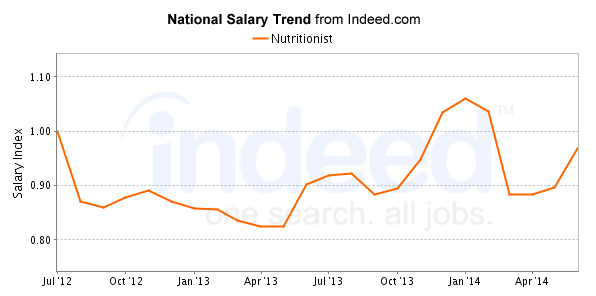The Ultimate Guide to Finding the Best Nutritionist in Your Area
Tired of generic diet advice and ready for a personalized approach to your health? Finding the right nutritionist near me can feel overwhelming, but it doesn't have to be. This guide provides everything you need to locate, vet, and connect with a qualified nutrition expert in your area, setting you on the path to sustainable healthy habits.
Finding the Right Nutrition Professional: Dietitian vs. Nutritionist
Navigating the world of nutrition professionals can be confusing. The terms "nutritionist" and "dietitian near me" are often used interchangeably, but there are important distinctions. While both can provide healthy eating advice, their qualifications and legal standings differ significantly.
A Registered Dietitian (RD) or Registered Dietitian Nutritionist (RDN) has met specific educational and professional requirements established by the Academy of Nutrition and Dietetics. These requirements include a bachelor's degree in dietetics, completion of a supervised practice program, passing a national registration examination, and ongoing continuing education. In many states, only RDs or RDNs can legally provide medical nutrition therapy. They are qualified to assess nutritional needs, develop personalized nutrition plans, and provide counseling for a wide range of medical conditions.
The term "nutritionist," on the other hand, is less regulated. In some states, anyone can call themselves a nutritionist, regardless of their education or experience. While some nutritionists may have legitimate training and expertise, it's crucial to verify their credentials carefully. Look for certifications from reputable organizations, such as the Certified Nutrition Specialist (CNS) or the Board for Certification of Nutrition Specialists (BCNS). If you're seeking advice for a specific medical condition, an RD or RDN is generally the best choice. According to a 2024 study published in the Journal of the Academy of Nutrition and Dietetics, individuals working with registered dietitians were more likely to achieve their health goals compared to those working with non-credentialed nutritionists.
Defining Your Nutritional Needs and Goals
Before you start searching for a nutritionist near me, take some time to clarify your specific needs and goals. This will help you narrow down your search and find a professional who is the right fit for you. Are you looking for assistance with weight management, managing a specific medical condition (such as diabetes or heart disease), improving your athletic performance, or simply adopting healthier eating habits?
Consider the following questions:
- What are your primary health goals?
- Do you have any underlying medical conditions or dietary restrictions?
- What is your budget for nutrition counseling?
- What type of support are you looking for (e.g., individual counseling, group classes, meal planning)?
Having a clear understanding of your needs and goals will make it easier to communicate your expectations to potential nutrition professionals and ensure that you receive the most effective and personalized care.
Finding a Qualified Nutritionist or Dietitian in Your Area
Once you've defined your needs and goals, it's time to start searching for a nutritionist near me. Here are several strategies you can use:
- Online Directories: Websites such as the Academy of Nutrition and Dietetics' "Find an Expert" tool, NutritionEd.org, and Zocdoc allow you to search for registered dietitians and nutritionists in your area.
- Healthcare Provider Referrals: Ask your primary care physician or other healthcare providers for recommendations. They may be able to refer you to a qualified clinical nutritionist or registered dietitian in their network.
- Insurance Provider: Contact your health insurance company to see if they have a list of covered nutrition professionals in your area. Some insurance plans may cover nutrition counseling services, particularly for specific medical conditions.
- Online Reviews and Testimonials: Check online reviews and testimonials on websites such as Google, Yelp, and Healthgrades to get insights into other patients' experiences with different nutrition professionals.
When searching online, use specific keywords such as "sports nutritionist near me," "weight management specialist near me," or "nutrition counseling for diabetes near me" to refine your search results.
Verifying Credentials and Experience
It's crucial to verify the credentials and experience of any nutritionist or dietitian you're considering. Don't hesitate to ask about their education, certifications, and areas of expertise.
Checking for Specializations
Many nutrition professionals specialize in specific areas, such as sports nutrition, pediatric nutrition, or diabetes management. Make sure the professional you choose has experience working with clients who have similar needs and goals as you.
Reading Reviews and Testimonials
Online reviews can provide valuable insights into the quality of care and the overall patient experience. Look for patterns in the reviews, both positive and negative, to get a better understanding of what to expect.
Evaluating Potential Nutritionists: Questions to Ask
Before committing to a nutrition consultation, it's important to have a conversation with potential nutritionists to assess their suitability for your needs. Here are some key questions to ask:
- What are your qualifications and credentials?
- What is your area of expertise or specialization?
- What is your approach to nutrition counseling and personalized nutrition plan development?
- What can I expect during a typical consultation?
- What is your fee structure and what forms of payment do you accept?
- Do you accept my health insurance?
- Can you provide references from previous clients?
Pay attention to how the nutritionist answers your questions. Are they knowledgeable, patient, and responsive? Do they seem genuinely interested in helping you achieve your goals? Do they communicate in a way that is easy to understand?
Understanding the Cost and Coverage of Nutrition Services
The cost of nutrition consultation and counseling can vary widely depending on the nutritionist's qualifications, experience, location, and the type of services provided. Some nutritionists charge by the hour, while others offer package deals that include multiple sessions and meal planning services.
It's important to inquire about the nutritionist's fee structure upfront and to understand what services are included in the cost. Some health insurance plans may cover nutrition counseling services, particularly if they are prescribed by a physician for a specific medical condition. Check with your insurance provider to determine your coverage and whether you need a referral.
Here's a sample table illustrating typical nutritionist fees:
| Service | Average Cost | Description |
|---|---|---|
| Initial Consultation (60-90 minutes) | $100 - $250 | Comprehensive assessment of your health history, dietary habits, and goals. |
| Follow-up Consultation (30-60 minutes) | $50 - $150 | Review of progress, adjustments to your personalized nutrition plan, and ongoing support. |
| Meal Planning Service | $75 - $200 per week | Customized meal plans tailored to your specific needs and preferences. |
| Group Nutrition Classes | $30 - $50 per class | Educational classes on various nutrition topics, such as healthy eating advice and cooking demonstrations. |
What to Expect During Your First Nutrition Consultation
Your first nutrition consultation will typically involve a comprehensive assessment of your health history, dietary habits, and goals. The nutritionist will ask you about your medical history, current medications, allergies, food preferences, and lifestyle factors. They may also conduct a physical assessment, such as measuring your weight, height, and body composition.
Based on this information, the nutritionist will develop a personalized nutrition plan that is tailored to your specific needs and goals. This plan may include recommendations for dietary changes, meal planning strategies, supplement use, and lifestyle modifications. You and the nutritionist will work together to set realistic and achievable goals and to develop strategies for overcoming any challenges you may encounter.
Benefits of Working with a Nutritionist
Working with a qualified nutritionist near me can provide numerous benefits, including:
- Improved dietary habits and overall health
- Effective weight management strategies
- Better management of chronic diseases, such as diabetes and heart disease
- Enhanced athletic performance
- Increased energy levels and improved mood
- Sustainable lifestyle changes
A nutritionist can provide you with the knowledge, skills, and support you need to make informed food choices and to achieve your health goals. They can also help you identify and overcome any barriers that may be preventing you from reaching your full potential.
Creating a Sustainable Nutrition Plan
The key to long-term success with any nutrition plan is sustainability. A restrictive or overly complicated plan is unlikely to be followed for an extended period of time. A good nutritionist near me will work with you to create a plan that fits your lifestyle, preferences, and cultural background. They will help you make gradual, sustainable changes that you can maintain over the long term.
Focusing on Whole Foods
A sustainable nutrition plan should emphasize whole, unprocessed foods, such as fruits, vegetables, whole grains, lean proteins, and healthy fats. These foods provide essential nutrients and fiber, which can help you feel full and satisfied.
Incorporating Your Preferences
A good nutritionist will take your food preferences into account when creating your plan. If you hate broccoli, they won't force you to eat it! They will work with you to find healthy alternatives that you enjoy.
Making Gradual Changes
Instead of trying to overhaul your diet overnight, focus on making small, gradual changes. For example, you could start by adding one serving of vegetables to each meal or by swapping sugary drinks for water.
Monitoring Progress and Making Adjustments
Regular follow-up appointments with your nutritionist near me are essential for monitoring your progress and making any necessary adjustments to your personalized nutrition plan. During these appointments, you can discuss any challenges you are facing, ask questions, and receive ongoing support. The nutritionist will also track your progress towards your goals and make adjustments to your plan as needed.
| Metric | Why it's Important | How it's Monitored |
|---|---|---|
| Weight | Indicates progress towards weight management goals. | Regular weigh-ins, tracking trends over time. |
| Body Composition | Provides insights into muscle mass and body fat percentage. | Using methods like bioelectrical impedance analysis (BIA). |
| Blood Sugar Levels | Essential for managing diabetes and preventing complications. | Regular blood glucose monitoring. |
| Cholesterol Levels | Important for heart health. | Periodic blood tests. |
| Energy Levels & Mood | Reflects overall well-being and the effectiveness of the nutrition plan. | Subjective assessments, tracking daily energy levels. |
FAQ About Finding a Nutritionist Near Me
Q: How much does it cost to see a nutritionist?
A: The cost varies depending on the nutritionist's qualifications, experience, and location. Initial consultations typically range from $100 to $250, while follow-up sessions can cost $50 to $150.
Q: Does insurance cover nutrition counseling?
A: Some insurance plans cover nutrition counseling, particularly if it is prescribed by a physician for a specific medical condition. Check with your insurance provider to determine your coverage.
Q: What is the difference between a nutritionist and a dietitian?
A: A Registered Dietitian (RD) or Registered Dietitian Nutritionist (RDN) has met specific educational and professional requirements, while the term "nutritionist" is less regulated. In many states, only RDs or RDNs can legally provide medical nutrition therapy.
Q: How do I find a qualified nutritionist near me?
A: Use online directories, ask your healthcare provider for referrals, or contact your insurance provider for a list of covered nutrition professionals. Verify their credentials and experience before committing to a consultation.
Q: What should I expect during my first nutrition consultation?
A: Your first consultation will typically involve a comprehensive assessment of your health history, dietary habits, and goals. The nutritionist will develop a personalized nutrition plan based on this information.
Finding the right nutritionist near me is an investment in your health and well-being. By following the steps outlined in this guide, you can locate a qualified professional who can help you achieve your nutrition goals and live a healthier, more fulfilling life. Now, we encourage you to take action. Search for registered dietitians in your area, schedule a preliminary call with one or two, and ask any further questions you may have. Share your experiences and insights in the comments below to help others on their journey to better health!

